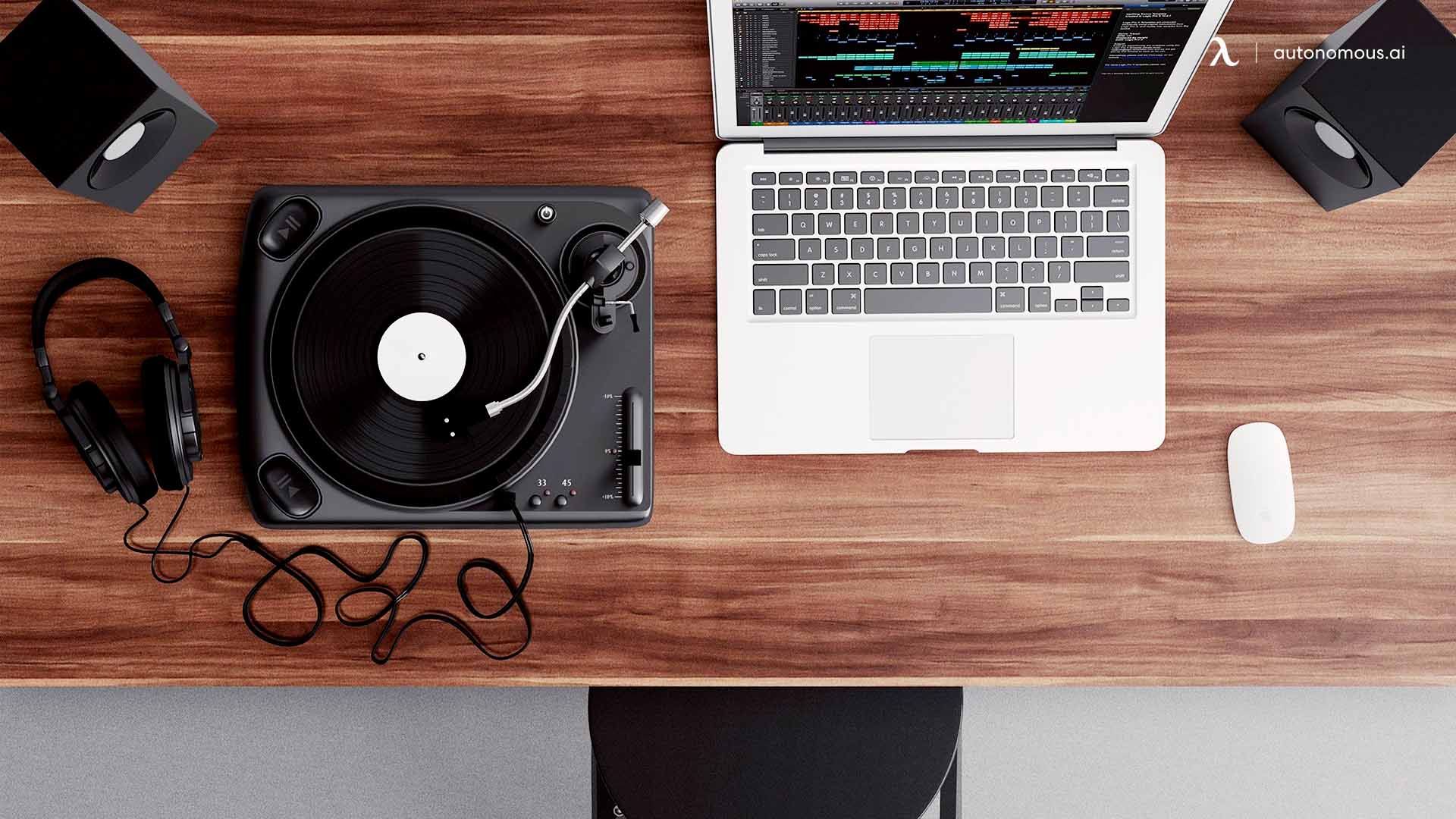Music has long been recognized as a powerful force in our lives, capable of evoking emotions, stirring memories, and even altering our moods. But beyond its emotional impact, music has also been found to have a significant influence on our cognitive functions and productivity. In this comprehensive exploration, we’ll delve into the fascinating relationship between music and productivity, uncovering the science behind this connection and providing practical insights on how to harness the power of music to elevate your work performance and efficiency.
The Science Behind Music and Productivity

Music’s impact on our brain and cognitive functions has been a subject of extensive research in recent years. Scientists have uncovered fascinating insights into how different types of music can affect our focus, motivation, and overall productivity.
When we listen to music, multiple areas of our brain are engaged simultaneously. The auditory cortex processes the sound, while the limbic system responds to the emotional aspects of the music. Meanwhile, the motor cortex can be activated, leading to physical responses like tapping our feet or nodding our heads to the rhythm.
The Role of Dopamine in Music-Induced Productivity
One of the key mechanisms behind music’s productivity-boosting effects is its ability to stimulate the release of dopamine in our brains. Dopamine is a neurotransmitter associated with pleasure, motivation, and reward.
When we listen to music we enjoy, our brain releases dopamine, creating a sense of pleasure and heightened mood. This elevated state can translate into increased motivation and energy, making tasks feel less daunting and more manageable.
Research has shown that this dopamine release can occur not only during the peak emotional moments of a song but also in anticipation of those moments. This suggests that familiar music can create a sustained state of positive arousal, potentially leading to prolonged periods of enhanced productivity.
The Impact of Music on Cognitive Performance
Beyond its mood-enhancing effects, music has been found to influence various aspects of cognitive performance directly. Studies have shown that certain types of music can improve memory, increase processing speed, and enhance creative problem-solving abilities.
For instance, a study published in the journal “Neuron” found that listening to music can activate the same neural pathways involved in sustaining attention. This suggests that the right kind of music could help maintain focus during prolonged tasks, potentially reducing mental fatigue and improving overall performance.
The Mozart Effect and Beyond
The concept of music enhancing cognitive performance gained widespread attention with the introduction of the “Mozart Effect” in the 1990s. This theory suggested that listening to Mozart’s music could temporarily boost spatial-temporal reasoning skills.
While subsequent research has shown that the Mozart Effect may have been overstated, it sparked a wealth of studies examining the relationship between music and cognitive functions. These studies have revealed that while classical music can indeed have positive effects, other genres and individual musical preferences play a significant role in determining the impact of music on productivity.
Choosing the Right Music for Maximum Productivity

Not all music is created equal when it comes to boosting productivity. The type of music that works best can vary depending on the task at hand, personal preferences, and individual cognitive styles. Understanding these factors can help you curate the perfect playlist for peak performance.
The Impact of Lyrics on Cognitive Load
One of the most crucial factors to consider when selecting music for productivity is the presence or absence of lyrics. Research has shown that lyrics can have a significant impact on our ability to focus, particularly during tasks that involve language processing.
When we listen to music with lyrics, our brain naturally tries to process and understand the words. This can create cognitive interference, especially when we’re engaged in tasks that require verbal processing, such as writing, reading, or problem-solving that involves language.
For tasks that don’t heavily rely on language processing, such as data entry or visual design, the impact of lyrics may be less pronounced. Some individuals even find that familiar lyrics can create a comforting background that enhances their focus.
To maximize productivity, consider opting for instrumental music when working on language-heavy tasks, and save lyrical music for activities that are more routine or visually oriented.
The Tempo and Rhythm Factor
The tempo and rhythm of music can significantly influence our energy levels and work pace. Fast-paced music with a strong beat can increase arousal and energy, potentially leading to faster work rates. This can be particularly beneficial for repetitive tasks or when you need a boost of motivation.
However, it’s essential to strike a balance. Music that is too fast or complex can become distracting or overwhelming, potentially hindering rather than helping productivity. Research suggests that moderate tempos, typically between 60-80 beats per minute, are often ideal for sustained focus and productivity.
Consider matching the tempo of your music to the desired pace of your work. Upbeat music can be great for brainstorming sessions or when you need to power through a task quickly, while more moderate tempos might be better suited for detailed, focused work.
Genre Considerations and Personal Preferences
While certain genres like classical and ambient music are often touted as ideal for productivity, personal preference plays a crucial role in the effectiveness of music as a productivity tool.
Research has shown that familiarity and enjoyment of the music can enhance its positive effects on mood and performance. This means that if you enjoy a particular genre, it’s likely to be more effective in boosting your productivity than a genre that’s traditionally recommended but not to your taste.
Experiment with different genres to find what works best for you. Some people find that nature sounds or white noise provide the perfect background for focus, while others might prefer jazz, electronic music, or even heavy metal.
Remember that your optimal productivity music may vary depending on the task, your mood, and even the time of day. Be flexible and willing to adjust your playlist as needed.
Implementing Music in Your Work Routine

Now that we understand the science behind music and productivity and have explored how to choose the right music, let’s look at practical strategies for incorporating music into your work routine effectively.
Creating Task-Specific Playlists
One effective strategy is to create different playlists tailored to specific types of tasks or work modes. This approach allows you to quickly shift into the right mindset for different activities throughout your day.
For example, you might have a high-energy playlist for brainstorming sessions or tackling your to-do list, a more mellow instrumental playlist for focused writing or coding, and a familiar, comforting playlist for routine tasks like data entry or email management.
By associating certain playlists with specific tasks, you can create powerful auditory cues that signal to your brain it’s time to focus on a particular type of work. Over time, this can help you transition more quickly and easily between different work modes.
Timing Your Music Sessions
While music can be a powerful productivity tool, it’s important to use it strategically. Continuous music throughout the day might lead to fatigue or diminished effectiveness over time.
Consider using the Pomodoro Technique or a similar time-management method, incorporating music into your focused work sessions and taking breaks in silence. This approach can help maintain the novelty and effectiveness of music as a productivity enhancer.
For instance, you might work for 25 minutes with music, followed by a 5-minute break in silence. This alternation can help prevent auditory fatigue and maintain the motivational impact of your chosen music.
Adjusting Volume and Using Headphones
The volume of your music can significantly impact its effectiveness as a productivity tool. Music that’s too loud can become distracting or even stress-inducing, while music that’s too quiet might not provide the desired focus-enhancing effects.
Experiment with different volume levels to find your sweet spot. Many people find that having music at a level where it’s just audible but not intrusive works best for maintaining focus.
Using headphones can be particularly effective, especially in open office environments. Headphones not only allow you to control your auditory environment but can also signal to others that you’re in a focused work mode, reducing interruptions.
Overcoming Challenges and Potential Pitfalls

While music can be a powerful productivity booster, it’s not without its challenges. Being aware of potential pitfalls can help you maximize the benefits of music in your work routine.
Avoiding the Familiarity Trap
One common issue is becoming too reliant on a particular playlist or type of music. While familiarity can be comforting and help you quickly get into a productive mindset, it can also lead to diminishing returns over time.
Our brains are wired to seek novelty, and what was once motivating background music can become boring or even distracting if overused. To combat this, regularly update your playlists and explore new genres or artists.
Consider creating a rotating selection of playlists for each work mode, allowing you to maintain the benefits of familiar cues while providing enough variety to keep your brain engaged.
Managing Distractions and Interruptions
While music can help create a focused environment, it’s important to be mindful of how it might interact with other potential distractions in your workspace.
If you’re using streaming services, for instance, be cautious of visual notifications or the temptation to frequently skip tracks or adjust your playlist. These small interruptions can add up and significantly impact your focus and productivity.
Consider using offline playlists or dedicated music players to minimize these distractions. Some people find that longer pieces of music or ambient soundscapes can be particularly effective, as they require less frequent interaction.
Respecting Others in Shared Spaces
If you work in a shared environment, it’s crucial to be considerate of your colleagues’ needs and preferences. Not everyone finds music conducive to their productivity, and your choices could potentially impact others’ ability to focus.
Use headphones when working in shared spaces, and be mindful of sound leakage. If you’re in a position to influence your work environment, consider designating quiet zones and areas where background music is acceptable.
Conclusion: Harmonizing Your Work Life with the Power of Music
Music has the potential to be a powerful ally in our quest for increased productivity and work satisfaction. By understanding the science behind music’s impact on our cognitive functions, carefully selecting the right tunes for different tasks, and implementing strategic approaches to incorporating music into our work routines, we can unlock new levels of focus, creativity, and efficiency.
Remember that the relationship between music and productivity is highly personal. What works for one person may not work for another, and what’s effective for one type of task might be counterproductive for another. The key is to experiment, remain flexible, and pay attention to how different musical choices affect your performance and well-being.
As you embark on your journey to harness the productivity-boosting power of music, approach it with a spirit of curiosity and playfulness. Allow yourself to explore different genres, create diverse playlists, and fine-tune your auditory environment. With time and attention, you’ll develop a personalized approach that not only enhances your productivity but also makes your work experience more enjoyable and fulfilling.
By thoughtfully integrating music into your work life, you’re not just optimizing for productivity – you’re creating a richer, more harmonious work experience that resonates with your personal rhythm and style. So put on those headphones, press play, and let the music guide you to new heights of productivity and professional satisfaction.
